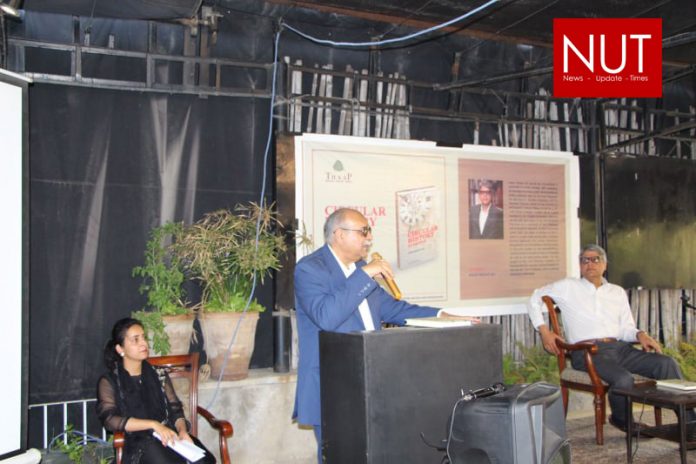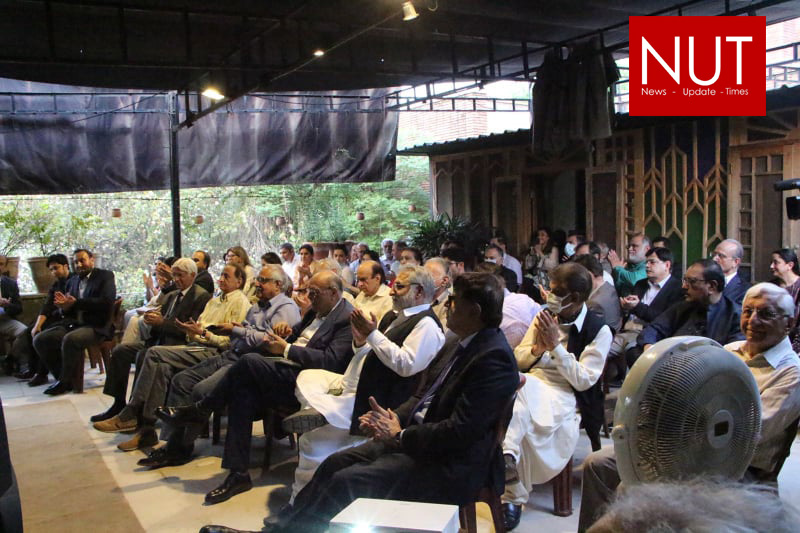Lahore (Muhammad Yasir) THAAP organized a discussion event about the recently published book, Circular History of Pakistan, authored by Asim Imdad Ali. The event was attended in Lahore by intellectuals, former public servants, notable media, and historians. Asim Imdad Ali is a lawyer and an alumnus of Harvard University and King’s College, London, and has written in print media on the administrative, constitutional, and political history of Pakistan as well as international affairs.
Asim has also taught at the Civil Services Academy of Pakistan and has been the President of the Harvard Club of Pakistan. The central thesis of the book, Circular History of Pakistan, is that our cyclical political history is, in fact, like a short movie clip, set on a time-loop, that creates perpetual déjà vu for those in the theater. Every political scene has been enacted before and is being re-telecast repeatedly.
We are stuck in circular time and history and have not found our Nirvanic moment to follow the alternative trajectory of linear growth and development. Ar Mehreen Mustafa, Secretary to THAAP welcomed the guest and provided a comprehensive over view of THAAP. Mr. Pervaiz Vandal, the Managing director of THAAP, discussed the similarities between the ethos of THAAP and Asim Imdad Ali’s book Circular histories of Pakistan. He also stressed on the need habitual reading of diverse form of literature in order to enhance one’s creativity thus ultimately improving the state of the country. He highlighted the need to adopt a holistic , inclusinve and practice oriented approch to education.
E Asim Imdad Ali then took to the podium to discuss the overarching theme of his book that questions the cyclical nature of the hurdles the country has to face. These issues limit the nation and cause it to not progress linearly. He read an excerpt from his book which helped us understand his nuanced view of the histories that over power the people of Pakistan, thus creating a unique and thought provoking view of the nation. Najam Sethi, former chief minister of Punjab, Chairperson PCB and renowned journalist personality, highlighted the linearity and circularity embedded in our understanding of the history of Pakistan.
Through metaphoric and figurative references, he brought the attention to the current political state of Pakistan and how we tend to accept the same regime in new packaging. He concluded that from time and time again this process has yielded undesirable results and stressed on the optimistic need to overcome the current challenges. Thus, furthering the points made by Asim Imdad Ali in his books. In his video message, Dr. Akbar S. Ahmed, author, poet, playwright, filmmaker, and former diplomat, who currently holds the Ibn Khaldun Chair of Islamic Studies and is Professor of International Relations at the American University in Washington, D.C., praised Asim Imdad Ali ‘s professional and intellectual trajectory and congratulated him for his successful endeavors.
The book, Circular History of Pakistan, recounts the political journey of a recurring, predictable, painful, and vicious decade-long Samsara of cyclic birth and death of order and freedom. The author describes how the same episodes keep happening with mind-boggling regularity. This circular political past primarily shapes contemporary events. The author maintains that there are established ways to get out of vicious cycles. The key to triggering an endless growth cycle is investment in innovation, knowledge, people, and creativity.
That is the only real virtuous cycle: without that, there can only be one-off spurts of growth, but only an investment in scientific research and innovation can generate the continuous growth cycle. Without that shift away from geo-rentals and geo-politics, we will never change our course and our trajectory. Only by investing in geo-economics, people, knowledge banks, and critical technologies can we join the virtuous growth and development cycles.







